Hotline: +381 61 63 84 071
Migrants staying in Serbia 10 months on average, the state is to create conditions for their integration

Serbia should work on creating conditions for long-term support and integration of refugees and migrants, as they are not simply in transit any longer, but are staying in the country for up to 10 months on average - this is the conclusion of the presented research “Opportunities and obstacles for the inclusion of refugees and migrants into the main streams of society in Serbia”.
As it was stated at the presentation of the research results, in Belgrade Media Center, Serbia has a good normative framework, as well as integration policies that have not been adequately utilized so far.
Authors of the research stated that, in the process of the integration of migrants, special attention should be paid to the prevention of discrimination and marginalization, as well as to combating racism and xenophobia.
Director of the Konrad Adenauer Foundation in Serbia, Norbert Beckmann-Dierkes, assessed that the integration of migrants and refugees into European societies requires better networking of institutions, and greater understanding of social circumstances in the migrants’ countries of origin.
“We are no longer at the beginning of the migrant crisis, and, as it has always been the case so far, in order to respond to the challenges persons in need of refuge are facing, we must cooperate at the state level, but also at the level of local communities,” said Beckmann-Dierkes.
Speaking about the position of women migrants, Jelena Hrnjak from the Association “Atina” said that about 66 percent of interviewed women stated they have suffered violence, and that many of them confirmed they do not feel safe in reception centers, and often choose not to leave their rooms.
“Despite the fact that the violence they suffered in the countries of origin is often the reason why they are seeking asylum, officials here do not recognize it as a sufficient reason for granting asylum,” said Jelena Hrnjak.
Presenting results of the research on the education of refugees, Milan Aleksic from the Association “Atina” said that children from the refugee population were enrolled in schools this year, however there are remaining issues when it comes to the inclusion of parents into the education process.
The research was jointly conducted by Konrad Adenauer Foundation, Association “Atina” and Macedonian Lawyers Association, with the support of the European Union.
The original text can be found here:
https://beta.rs/vesti/drustvo-migranti/80119-studija-migranti-prosecno-1...












 FACEBOOK
FACEBOOK TWITTER
TWITTER YOUTUBE
YOUTUBE